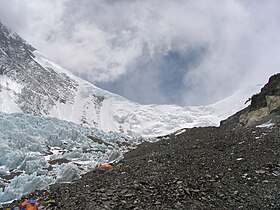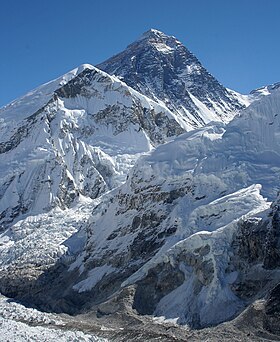The North Col (Chinese: 北å³; pinyin: BÄ›i Ào; Tibetan: Chang La) refers to the sharp-edged pass carved by glaciers in the ridge connecting Mount Everest and Changtse in Tibet, China. It forms the head of the East Rongbuk Glacier.
When climbers attempt to climb Everest via the North ridge (Tibet), the first camp on the mountain itself (traditional Camp IV, modern Camp I) is established on the North Col. From this point at approximately 7,020 metres (23,030Â ft) above sea level, climbers ascend the North Ridge to reach a series of progressively higher camps along the North Face of Everest. Climbers make their final push to the summit from Camp VI at 8,230 meters (27,001Â ft) altitude.
The North Col was first climbed by George Mallory, Edward Oliver Wheeler and Guy Bullock on September 23, 1921. This was the first time a Westerner had set foot on Mount Everest itself. The North Col was discovered by Mallory while searching for possible routes to the summit of Mount Everest during the British reconnaissance expedition. All subsequent expeditions in the 1920s and 1930s attempted to reach the summit of Everest by using the North Col.
Overview

See also

- South Col
- Sagarmatha National Park
- Geology of the Himalaya
- Geography of China
References
.jpg/220px-1921_Mount_Everest_expedition_members_(cropped).jpg)
External links
- Painting of the Camp on North-Col

Posting Komentar